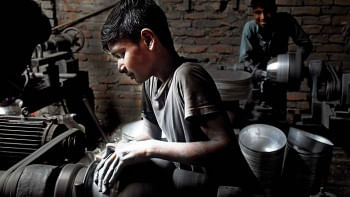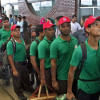Desperation deepens for informal workers

At around 7:00am last Thursday, with temperatures hovering at a chilly 13°C, Rashida Khatun arrived at the capital's Agargaon intersection.
The 55-year-old, with sandals worn from her daily trek to the spot, found a seat on a concrete structure on the sidewalk. Once situated, she wrapped herself up in a thin sheet and began her wait.
She was hoping to find employment at the location, which is a popular "labour haat", a floating marketplace from which day labourers are hired.
Rashida regularly comes to the spot to find work as a housemaid on a daily basis and also works as a labourer at construction sites.
"Although I come here every day, I am often unable to find a job. If I am hired for a day, I can earn Tk 600 to Tk 700. Otherwise, I have to return empty-handed," Rashida, who hails from Nakla upazila in Sherpur, told The Daily Star.
She has found only six days of work in the new year despite braving the cold every day until January 18.
Rashida, who was abandoned by her husband shortly after giving birth to their first child, lives at Agargaon slum.
"If I remain idle, it costs me more," she said.
Rashida is one of 5.97 crore informal workers in the country and her story reflects that of lakhs of day labourers, who are struggling to contend with rising living costs stemming from elevated inflation for the past two years.
Average wage growth remained well below the inflation rate in Bangladesh for the 23rd straight month as per the Bangladesh Bureau of Statistics (BBS), indicating a worsening situation and compelling many to cut consumption amid falling real income.
With prices of essentials rising and work apparently at a premium, Rashida has had to cut back on everything, including winter vegetables.
"Potatoes and onions are usually affordable in winter, but this time around prices are still so high. I have reduced my consumption of onions and I couldn't even manage 250 grams of beef this month," she lamented.
"Although I live in a tiny room, I have to pay Tk 2,300 per month. If I am even a little late with the payment, the owner asks me to leave the home," she said.
There are also additional expenses, ones that many urbanites do not even think about.
"I have to spend Tk 10 per day to bathe at the slum's pumphouse, which adds up to Tk 300 monthly," she said, adding that she could not avail any government benefits, such as getting a family card to buy goods at subsidised prices from the Trading Corporation of Bangladesh, because her permanent address was not in the capital.
At 7:14am, another female labourer, Minara Begum, joined Khatun. She had travelled from a slum near The National Institute of Traumatology and Orthopaedic Rehabilitation.
By 7:30am, a total of four female and around 10 male labourers, equipped with spades and baskets, had arrived at the spot.
Among them was Nazimul Haque, who has worked as a mason for the past decade. He hails from Nachole upazila in Chapainawabganj and also lives in the Agargaon slum.
"Currently, there is reduced demand for masonry. It is very difficult to find a job daily," said the 45-year-old, who is the lone breadwinner in his six-member family.
"Prices of essential commodities have constantly been on the rise, but our wages have not been increasing at the same pace. I moved here to support my family financially but that becomes difficult when I can't manage a job because my personal costs do not come to a standstill."
He added that he would usually eat meals at messes or canteens, which costs him roughly Tk 200 per day.
When contacted on Thursday night, Haque told this newspaper that he ultimately could not manage to find any work that day.
Another regular at the labour haat is Fatema Begum, who also works as a housemaid, and is hoping to secure a better life for her two children.
"I usually earn Tk 6,000 per month as a housemaid. But it is not enough to run my family," she told The Daily Star on Thursday.
She said she was living in a slum at the BNP Bazar in Agargaon. Every month she has to pay Tk 2,600 as house rent and another Tk 100 as water bill.
"I have to spend a lion's share of my income on food and education costs, including notebooks, pens, and tuition fees," she said.
If she finds work at the labour haat, she works as a labourer from 8:00am to 5:00pm before rushing to her regular duties as a housemaid in the evening.
But her luck has also been turbulent as she has found work as a labourer for only seven days this month.
"I have already taken Tk 2,000 as advance from one of the houses where I work. I bought a 25kg sack of rice alongside lentils with the money. Every day I need one kilogramme of rice, which is what my children mostly consume."
"What if there is no work? I have to eat, my kids have to be fed. Our stomachs do not sit idle," she frustratedly said. "I never allow anyone to understand my pain. I always try to work."
The price of everything is increasing, but our wages are not increasing, she added.
Like the intersection in Agargaon, many other spots in Gabtoli, Kazipara, Kallayanpur, Mirpur 10, Malibagh rail gate, Maniknagar, Jatrabari and Bashabo are home to such floating labour markets.
This correspondent spoke to at least 10 workers and heard similar stories of hardship. Most of them are unskilled workers who moved to Dhaka from different parts of the country. Often, they are silent victims of climate change, displacement, and increasing unemployment in rural areas.
"As elevated inflation has persisted over two years, it's not difficult to understand the hardships informal workers are facing," said Selim Raihan, a professor at the University of Dhaka.
Usually, people try to adjust in various ways. But there are limitations to that and options can be quickly exhausted. There are limited coping strategies for the poor.
"As a result, people can buy less, and many are forced to exhaust their savings and other options against the backdrop of high inflation," said Raihan, who is also executive director of the South Asian Network on Economic Modeling, a think-tank.
"They feel serious food insecurity which affects their living standards. Similarly, the financial situation of informal workers, notably unskilled ones, lands in a very abysmal situation as they have no guaranteed income," he added.
According to the Labour Force Survey (LFS) 2022, of the 7 crore employed individuals in the country, around 85 percent, or about 6 crore, work in the informal sector. Of the total informal workers, around 88 percent are based in rural areas.
The problem is that most workers in urban areas are not under any kind of social protection programme, Raihan said.
The urban poor do not come under the government scanner. And they have no scope to avail government opportunities as they are asked to show their permanent address.
"There is no option but to bring unskilled workers, including those in urban areas, under social protection programmes," he said, mentioning the poor scope of extending labour market opportunities.
Raihan also suggested increasing the coverage of those programmes.

 For all latest news, follow The Daily Star's Google News channel.
For all latest news, follow The Daily Star's Google News channel. 














Comments